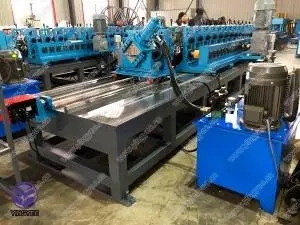
Understanding Drywall Forming Machines A Comprehensive Overview
In the construction industry, efficiency and quality are paramount, and one of the critical components that enhance these aspects is the drywall forming machine. These machines play a significant role in the manufacturing of drywall panels, which are essential materials used in building walls and ceilings. In this article, we will explore the functionality, advantages, and advancements in drywall forming machines.
What is a Drywall Forming Machine?
A drywall forming machine is specialized equipment designed to produce drywall panels. The process typically involves mixing gypsum powder with water and other additives to create a slurry, which is then spread between two sheets of liner board. The entire setup is carefully controlled to ensure that the panels are uniform in thickness and density. Once the slurry is formed, the machine undergoes a drying phase, after which the sheets are cut to size for shipment.
Advantages of Using Drywall Forming Machines
1. Increased Efficiency One of the most significant benefits of drywall forming machines is the increase in production speed. Automated processes allow for rapid production compared to manual methods, reducing labor costs and increasing output.
2. Consistent Quality These machines ensure that the manufactured drywall panels meet specific industry standards. Quality control is integrated into the production line, which minimizes defects and maintains uniformity across batches.
3. Customization Options Modern drywall forming machines can be easily adjusted to produce various sizes and types of drywall, including moisture-resistant panels and fire-rated products. This flexibility caters to diverse construction needs.

4. Waste Reduction Advanced technology in drywall forming reduces material waste. The precise control over the amount of slurry used leads to optimal resource utilization, positively impacting the bottom line and the environment.
Recent Advancements in Technology
The drywall forming machine industry has seen significant technological advancements in recent years. Automation and smart technology have transformed traditional production lines. Machines equipped with advanced sensors can monitor the mixing, forming, and drying processes in real time, allowing for quick adjustments to maintain quality.
Furthermore, Industry 4.0 principles have started to influence the drywall manufacturing process. Integrating IoT (Internet of Things) devices enables manufacturers to collect and analyze data more effectively, improving predictive maintenance, production tracking, and supply chain management.
Conclusion
As the demand for drywall continues to rise with urbanization and infrastructure development, the role of drywall forming machines is becoming increasingly important. These machines not only enhance productivity and efficiency but also contribute significantly to the overall quality of construction. Manufacturers looking to remain competitive must consider investing in the latest drywall forming technology to stay ahead of industry trends.
In summary, drywall forming machines are indispensable tools in modern construction. Their efficiency, consistency, and adaptability make them a vital component of drywall production. As technology continues to evolve, these machines will likely play an even greater role in shaping the future of construction, driving innovation and sustainability in the industry.